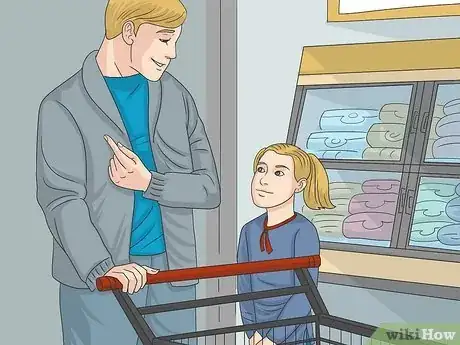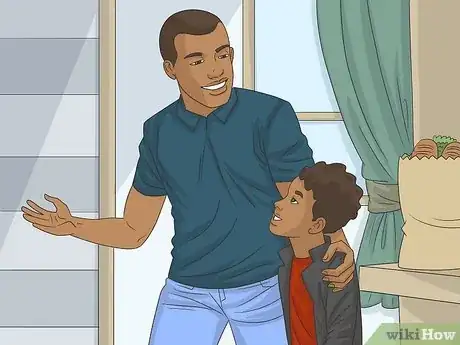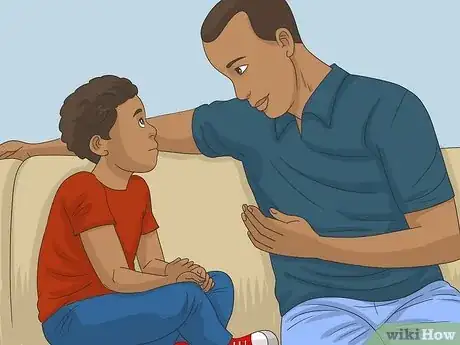This article was co-authored by Wits End Parenting. Wits End Parenting is a parent-coaching practice based in Berkeley, California specializing in strong-willed, “spirited” children with impulsivity, emotional volatility, difficulty “listening,” defiance, and aggression. Wits End Parenting's counselors incorporate positive discipline that is tailored to each child’s temperament while also providing long-term results, freeing parents from the need to continually re-invent their discipline strategies.
This article has been viewed 26,591 times.
Children need boundaries at any age, and those boundaries should be set by their parent or caregiver. Going into public often calls for a different set of boundaries than are needed at home. These expectations have to be communicated well to your child before you go into public and then reinforced appropriately.
Steps
Setting Reasonable Expectations
-
1Make sure your expectations are age appropriate. Children develop at their own pace. There are developmental milestones that provide a guideline for things that a child might be expected to do, but there is no guarantee that your child isn’t a little ahead or behind that guideline. Do some research to learn about these milestones, since they are not common knowledge. Before you go out, you should keep in mind the age of your child and the behaviors that they typically display, and evaluate whether your expectations are realistic. If they are not, you need to set achievable goals for your children.[1]
- For example, asking a four year old to sit still for ten minutes while getting their hair cut might be reasonable. Asking the same four year old to sit still for thirty minutes while you wait on your food is probably unrealistic.
- If you are going somewhere that requires a particular standard of behavior that your child is not ready to meet, you should consider getting a babysitter for the event.
-
2Explain to your child what is off-limits.[2] Everything from your cat’s water bowl to the candy at the bottom of the checkout aisle appears to be fair game to your children. You can explain to them that some things aren’t for them, but keep in mind that the parts of the brain responsible for regulating emotions and impulses develop very slowly (meaning that children either don’t have them yet, or they aren’t well developed yet). Expecting a young child to consistently resist these temptations is unrealistic, but it does not mean you shouldn’t try. By trying to guide them towards impulse control, you will be helping them to develop this skill. Think ahead to what things might grab your child’s attention and try to minimize the number of times they have to resist playing with something that they shouldn’t.[3]
- For example, if you are going through the grocery store checkout, it might be better to choose the self checkout lane that doesn’t have candy at your child’s eye level. This will remove the temptation for them to grab the candy.
Advertisement -
3Give your child some control. Children are not always capable of making decisions for themselves, so parents generally do this for them. That in mind, children also need to feel like they get to make some on their own choices. If you are not creating opportunities for them to do this when you go out, it is not realistic to expect their cooperation with your decisions. Plan for something on the trip to be left up to your child’s discretion to buy for the reasonable behavior you discussed with them.[4] Be sure to discuss this before you leave for the trip to get them excited and give them a reason to exercise the desired behavior.
- For example, if you decide that you are going to the grocery store to get milk and cereal, you could let your child pick the kind of cereal they want to have.
- You can even limit some choices to let your child pick between things that you present them. In the case of cereal, you could offer to let them choose Cheerios or Raisin Bran if you wanted to avoid chocolate or fruity cereals that are packed with sugar.
-
4Evaluate your expectations. Put yourself in your child’s shoes and think about how you would feel on this trip. Are they expected to go a long time without a snack or to sit still for extended periods of time? If you find that you would be uncomfortable on the trip, your child certainly will be, too. Change any expectations that you think your child cannot meet and set them up with expectations that they can meet.
Communicating Your Expectations Before Leaving
-
1Talk to your child. One of the best ways to set your child up for success is to talk to them on a regular basis. Let them know where you will be going, and what you plan to do there. Give them an idea of how long you will be gone, and when they can expect to play, eat, or come home.[5]
- Have them repeat this back to you so that it sticks. This will give them a sense of control and something to look forward to.
-
2Explain expectations clearly.[6] When you set expectations for children, they should be very explicit. Most children have limited vocabularies compared to adults, and have trouble interpreting abstract ideas. Tell your children exactly what you expect them to do in each situation that they are going to encounter.[7]
- For example, you should tell your children something like “At the store, I expect you to use your inside voice and walk beside me,” instead of a vague statement like “I expect you to be good at the store.” You might interpret both of those sentences to mean the same thing, but your child doesn’t understand what “good” is unless you tell them how to be “good.”
-
3Discuss ways to meet your expectations. Once you tell a child exactly what you want them to do, you can give them strategies to succeed. Come up with a way that the child can gauge their own behavior to limit the amount of times that you have to intervene. Being told that they are not meeting your expectations repeatedly will frustrate children and make it even harder for them to focus on the goals that you gave them.[8]
- For example, if you have set the expectation that your child will alongside you in the store, you can tell them something like “Your arm should always be able to touch me or the cart. If you can’t reach me or the cart, then you are too far away and should come closer.” This lets the child gauge their distance in a way that they can understand instead of an abstract “Stay beside me.”
- You can also roleplay with your child before going somewhere. This way, they get practice meeting your expectations and feel confident when they are put in a public situation. For example, you could practice things like saying “thank you” when someone gives them something.[9]
Reinforcing Your Expectations While You Are Out
-
1Prompt appropriate behaviors. Even the best intentioned children are prone to get distracted or sidetracked (just like adults). When you see this happening, you should prompt your child to go back to doing things the way that you discussed before coming out. This gives them a chance to get back on track before you directly point out that they aren’t meeting your expectations.[10]
- For example, if your child has strayed a little too far from the cart, you could say something like “Watch me. I can touch the cart. Can you touch the cart?” This will usually prompt them to come back to where they can touch the cart.
-
2Reference your earlier conversation. If prompting your child does not bring them back to meeting your expectations, bring up that you talked about the scenario before leaving. This will remind your child of the conversation and the expectations that were agreed upon. It will also remind them that they agreed to those terms before coming out with you.[11]
- For example, you might say something like “Do you remember when we talked earlier? You told me you would stay close enough to touch the cart. I expect you to come back so that you can keep that promise.”
-
3Explain the consequences for inappropriate behavior.[12] If the behavior continues to be unacceptable, you will have to discuss consequences with your children. Pull them aside quietly and talk to them rather than embarrassing them in front of people. Be sure to kneel down when you talk with them and stay calm as you do so. Make it clear that your expectations are not being met, and that in order for you both to continue having fun they need to start doing the things that you have asked them to do.[13]
- For example, you could pull your child aside to an empty aisle in the store and explain that their behavior is making it difficult to finish the grocery trip. You could say something like “You agreed to stay close enough to touch the cart while we were shopping. If you can’t do that anymore, we will have to end our trip early. This means that you will not get a chance to pick out your cereal.”
Discussing Their Behavior After the Outing
-
1Talk to your children about the outing. On your way home is a great time to discuss the outing that you had. Ask your kids what they enjoyed and what they didn’t enjoy. Use this to recap on how they did or did not meet your expectations on this trip.[14]
- For example, you might ask your children questions like “What was your favorite part of the movie?” Then you can follow it up with a statement like “I was very proud that you sat quietly like we discussed.”
-
2Highlight good behaviors. Children crave attention from their caregivers. By giving them positive attention when they do the things you have asked, you fulfill that need. Also, let them hear you brag about their good behavior to your co-parent and to others. This helps to build your relationship with the child, and to reinforce the behaviors that you like to see.[15]
- You could reinforce good behaviors by saying things like “I was so proud that you stayed close enough to reach the cart through the whole trip. Thank you for doing what we talked about.”
-
3Connect inappropriate behaviors to consequences. If you need to address your child acting out, be sure to tie that to a consequence that they can understand. It helps if the consequence fits naturally with the acting out, instead of just being an assigned punishment of some kind. This will help your child understand the consequences that come with acting inappropriately in public places.[16]
- A good example of this would be to say something like “I was disappointed that you weren’t able to walk beside me in the store. It’s too bad that we couldn’t stay long enough to let you choose a cereal. Maybe next time we can do better and have time to get cereal.”
Expert Q&A
-
QuestionHow do you communicate expectations with a child?
 Wits End ParentingWits End Parenting is a parent-coaching practice based in Berkeley, California specializing in strong-willed, “spirited” children with impulsivity, emotional volatility, difficulty “listening,” defiance, and aggression. Wits End Parenting's counselors incorporate positive discipline that is tailored to each child’s temperament while also providing long-term results, freeing parents from the need to continually re-invent their discipline strategies.
Wits End ParentingWits End Parenting is a parent-coaching practice based in Berkeley, California specializing in strong-willed, “spirited” children with impulsivity, emotional volatility, difficulty “listening,” defiance, and aggression. Wits End Parenting's counselors incorporate positive discipline that is tailored to each child’s temperament while also providing long-term results, freeing parents from the need to continually re-invent their discipline strategies.
Parenting Specialists Try to model the behavior you want your child to use so they understand better.
Try to model the behavior you want your child to use so they understand better. -
QuestionHow do I teach my kids to behave in public?
 Wits End ParentingWits End Parenting is a parent-coaching practice based in Berkeley, California specializing in strong-willed, “spirited” children with impulsivity, emotional volatility, difficulty “listening,” defiance, and aggression. Wits End Parenting's counselors incorporate positive discipline that is tailored to each child’s temperament while also providing long-term results, freeing parents from the need to continually re-invent their discipline strategies.
Wits End ParentingWits End Parenting is a parent-coaching practice based in Berkeley, California specializing in strong-willed, “spirited” children with impulsivity, emotional volatility, difficulty “listening,” defiance, and aggression. Wits End Parenting's counselors incorporate positive discipline that is tailored to each child’s temperament while also providing long-term results, freeing parents from the need to continually re-invent their discipline strategies.
Parenting Specialists Before you go out, clearly tell them your expectations so they know how you want them to behave. Make sure you mention any consequences misbehaving might have.
Before you go out, clearly tell them your expectations so they know how you want them to behave. Make sure you mention any consequences misbehaving might have.
Warnings
- Don't give in because you're afraid of how other people will react. Giving in communicates that the child can get their way by misbehaving.⧼thumbs_response⧽
- This requires commitment on your part. Change does not happen overnight.⧼thumbs_response⧽
- Remain calm. State the facts as facts, without emotion. (You may need to practice deep-breathing and self-calming at home, to encourage yourself to remain calm when stressed) Example: "The sky is blue. If you continue to throw a fit, we will leave the store. You may quit throwing a fit, or you may leave leave." These should be facts, not emotional outbursts on your part.⧼thumbs_response⧽
References
- ↑ https://www.familyeducation.com/life/communicating-your-child/set-reasonable-expectations-goals-your-child
- ↑ Wits End Parenting. Parenting Specialists. Expert Interview. 5 March 2020.
- ↑ http://www.parents.com/toddlers-preschoolers/development/behavioral/manage-your-behavior-expectations/
- ↑ https://www.psychologytoday.com/blog/the-power-prime/201310/what-do-your-expectations-communicate-your-children
- ↑ https://www.psychologytoday.com/blog/the-power-prime/201310/what-do-your-expectations-communicate-your-children
- ↑ Wits End Parenting. Parenting Specialists. Expert Interview. 5 March 2020.
- ↑ https://childcare.extension.org/basic-tips-child-care-providers-can-use-to-guide-childrens-behavior/
- ↑ https://www.psychologytoday.com/blog/the-power-prime/201310/what-do-your-expectations-communicate-your-children
- ↑ http://behavioradvisor.com/ParentStrategies.html
- ↑ https://childcare.extension.org/basic-tips-child-care-providers-can-use-to-guide-childrens-behavior/
- ↑ https://childcare.extension.org/basic-tips-child-care-providers-can-use-to-guide-childrens-behavior/
- ↑ Wits End Parenting. Parenting Specialists. Expert Interview. 5 March 2020.
- ↑ https://childcare.extension.org/basic-tips-child-care-providers-can-use-to-guide-childrens-behavior/
- ↑ http://behavioradvisor.com/ParentStrategies.html
- ↑ https://childcare.extension.org/basic-tips-child-care-providers-can-use-to-guide-childrens-behavior/
- ↑ http://behavioradvisor.com/ParentStrategies.html






































































